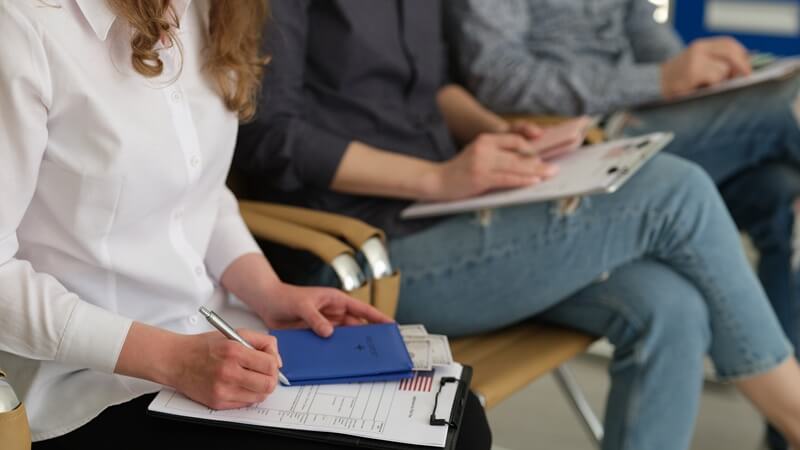Insightful Tips To Prepare For Your VAWA Interview
Preparing for a Violence Against Women Act (VAWA) interview can bring uncertainty and apprehension. However, the process is vital in seeking immigration relief, requiring focus and careful preparation to present a compelling case. Understanding the interview’s purpose and structure can help set clear expectations and reduce anxiety.
This guide provides actionable advice for approaching the VAWA interview with clarity and composure. It covers key topics such as the interview’s purpose, necessary documentation, preparation strategies, what to expect during the interview, and steps to take afterward. With the right tools and guidance, the process can become more manageable.

Understanding The Purpose Of The VAWA Interview
The Violence Against Women Act (VAWA) is a federal law enacted to protect survivors of domestic violence, abuse, or cruelty, regardless of gender. It provides a pathway for individuals to seek immigration relief without the involvement of their abuser. Under VAWA, survivors can self-petition for lawful status to escape abuse and rebuild their lives.
The interview is a critical step in this process. During this stage, U.S. Citizenship and Immigration Services (USCIS) officers review your case to assess whether you meet the requirements. They carefully examine the evidence and your testimony to ensure your claims are credible.
The interview focuses on two key elements: the authenticity of your relationship and the abusive nature of that connection. These components form the foundation of your petition but are subject to the discretion of the reviewing officer.
Officers will ask questions about your background, your relationship history, and specific instances of abuse. They may also examine how the abuse has affected your life and whether the relationship aligns with the documentation you’ve provided. This step avoids retraumatizing survivors while ensuring the petition meets legal eligibility standards.
Understanding the purpose and structure of the VAWA interview can help alleviate anxiety. This is your opportunity to present your story truthfully, supported by evidence, to demonstrate your need for the protections VAWA offers.
Bringing The Right Documents To Strengthen Your Case
Success in your VAWA interview begins with thorough preparation. Gathering and organizing the proper documents is critical to presenting a strong case. Below are the primary categories of documentation you should prepare.
Personal Identification
Your identification documents serve as the backbone of your application. These documents establish your identity and legal status. Examples include:
- A valid passport is required, even if it is expired in some cases.
- Your birth certificate is translated into English if necessary.
- Any other official identification issued by your home country or U.S. authorities.
These documents ensure that USCIS has accurate information about you and can proceed with reviewing your case without unnecessary delays. Having complete documentation helps establish trust in your claims. Properly organized papers also make it easier for officers to assess your eligibility efficiently.
Proof Of Abuse
Providing concrete evidence of abuse is one of the most critical aspects of your petition. The more detailed and specific your documentation, the stronger your case will be. Consider including:
- Medical Records: Documents from healthcare providers that record injuries related to the abuse can be compelling evidence.
- Police Reports: If law enforcement is involved, their reports can objectively confirm incidents.
- Photographs: Visual evidence of injuries, damaged property, or other signs of abuse can strengthen your case.
- Protective Orders: Legal documentation, such as restraining orders, demonstrates that the justice system recognized the abuse.
Collecting these documents can take time, so start as early as possible to ensure everything is ready by your interview date. Early preparation allows you to address gaps or missing items before they become an issue. Knowing you’re fully prepared when the day arrives gives you peace of mind.
Evidence Of The Relationship
USCIS requires clear evidence that the relationship was real. Documents such as marriage certificates or other legal records of your union are essential. Joint financial documents like bank statements, utility bills, or rental agreements can further demonstrate shared responsibilities, adding credibility to your case.
Photographs and correspondence that reflect the nature and timeline of your relationship also play a vital role. These items help illustrate the dynamics of your connection over time. USCIS carefully evaluates this evidence to determine authenticity, ensuring the relationship was legitimate rather than created solely for immigration benefits.
Supporting Affidavits
Statements from people who know you and can attest to your situation can provide a valuable third-party perspective. Ask trusted individuals, such as friends, family members, or community leaders, to write affidavits. These statements should include specific details about the abuse and your relationship with the abuser.
Affidavits provide valuable support by offering a fuller picture of your experience and backing up your claims. These statements should be detailed yet clear, focusing on specific incidents or observations related to your case. Always include the writer’s contact information so USCIS can verify the details.
Having well-organized and comprehensive documentation is only one part of building a strong case. Equally important is preparing yourself for the interview itself. This step involves presenting evidence and being mentally and emotionally ready to discuss your experiences.
Preparing To Discuss Your Experiences
Proper preparation goes beyond gathering documents. While having the right evidence is essential, how you approach the interview mentally and emotionally can make a significant difference. This step requires reflection, focus, and discussing sensitive experiences.
Practice Telling Your Story
The interview will require you to recount your experiences, often in detail. Practice telling your story clearly and chronologically. Focus on significant events, including specific instances of abuse, how they occurred, and their impact on you. Rehearsing your narrative can help you stay composed during the interview.
Address Emotional Readiness
Discussing traumatic experiences can bring up strong emotions, and that’s okay. It’s critical to acknowledge this and prepare yourself emotionally. Working with a therapist or joining a support group can help you process these feelings and develop tools for staying calm during the interview.
Work With An Experienced Attorney
A knowledgeable attorney can guide you through every stage of the process. They help you understand the process, address concerns, and organize your documentation effectively. Legal representation can provide peace of mind, knowing you have someone in your corner advocating for you.
Facing The Process With Clarity & Composure
The VAWA interview is a significant step in your petition process and often feels deeply personal. Preparing for the questions ahead can reduce uncertainty and build confidence. Understanding how to handle questions, stay composed, and communicate effectively makes a big difference. Here are some tips to consider:
- Answer Questions Truthfully: Provide honest and accurate responses. Admit if you don’t remember a detail instead of guessing.
- Stay Calm Under Pressure: Anxiety is natural, but focus on taking deep breaths to stay collected. Clear thinking will help you give better answers.
- Take Your Time To Respond: Pause briefly to gather your thoughts before answering. Thoughtful responses carry more weight than rushed ones.
- Request Clarification When Needed: Ask the officer to rephrase unclear questions. Understanding ensures you can provide accurate and relevant answers.
- Stay Consistent With Your Statements: Your answers must aligned with the details in your petition and evidence. Consistency strengthens your credibility.
- Maintain Respectful Communication: Speak politely and professionally, even during tough questions. A respectful tone sets a positive atmosphere.
Approaching the VAWA interview with clarity and composure makes the experience less stressful and more productive. Prepare yourself mentally, stay honest, and communicate effectively to confidently share your story and support your case.
Taking Steps After Your Interview To Move Forward
After the interview, taking proactive steps ensures your case continues moving forward. Keep maintaining your momentum and addressing any potential concerns that may arise. Being organized and informed helps you remain prepared for any follow-up requirements or updates from USCIS.
Stay in regular contact with your attorney to discuss feedback from USCIS and plan the next steps. They can help clarify any issues from the interview and guide you in addressing requests or preparing further evidence. Their support is key to navigating post-interview requirements efficiently.
If USCIS requests additional documentation, respond quickly to avoid delays. Submit accurate and complete materials, working closely with your attorney to meet deadlines. Throughout this, legal representation helps you handle these steps effectively, giving you confidence as you move toward a resolution.
Relying On LGL – Abogados De Inmigración For Legal Support

The legal process for VAWA cases can be challenging, and your current decisions can significantly impact your future. At Lincoln-Goldfinch Law – Abogados de Inmigración, we are here to guide you through every step and offer the support and care you need during this critical time. Our mission is to help survivors like you find safety and security as you work toward a better future.
We approach every case with compassion and a focus on your unique needs. Whether you’re preparing for your interview, gathering evidence, or addressing USCIS requests, we’ll provide the guidance you need to feel confident. Our team understands the sensitive nature of your situation and works diligently to support you throughout the process.
If you’re ready to take the next step in your VAWA case, we’re prepared to help. With Lincoln-Goldfinch Law – Abogados de Inmigración by your side, you don’t have to face the legal process alone. Reach out today, and let us work toward the safety and resolution you deserve.
Summary
Preparing for a VAWA interview requires careful planning and emotional readiness. Organizing thorough documentation, understanding what to expect, and sharing your story are all vital steps. Confidence and clarity during the interview allow you to present your claims effectively, improving your chances of a favorable outcome.
It is equally important to take proactive steps after the interview, such as responding to requests promptly and staying informed. Lincoln-Goldfinch Law – Abogados de Inmigración is ready to assist you with legal guidance and support tailored to your case.
Contact A U.S. Immigration Attorney Today!
Categories
How To Find Us
What Our Clients Say
“This Lawfirm is great, very professional and helpful. I love that they are always in communication and always available for when you have questions . 100% recommended by me and my family. Thank you Lincoln-Goldfinch Law – Abogados de Inmigración”





